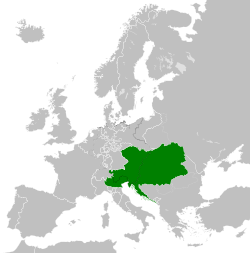This article includes a list of general references, but it lacks sufficient corresponding inline citations. (December 2021) |
| History of Austria |
|---|
 |
|
|
The Austrian Empire,[a] officially known as the Empire of Austria, was a multinational European great power from 1804 to 1867, created by proclamation out of the realms of the Habsburgs. During its existence, it was the third most populous monarchy in Europe after the Russian Empire and the United Kingdom, while geographically, it was the third-largest empire in Europe after the Russian Empire and the First French Empire.
The empire was proclaimed by Francis II in 1804 in response to Napoleon's declaration of the First French Empire, unifying all Habsburg possessions under one central government. It remained part of the Holy Roman Empire until the latter's dissolution in 1806. It continued fighting against Napoleon throughout the Napoleonic Wars, except for a period between 1809 and 1813, when Austria was first allied with Napoleon during the invasion of Russia and later neutral during the first few weeks of the Sixth Coalition War. Austria and its allies emerged victorious in the war, leading to the Congress of Vienna, which reaffirmed the empire as one of the great powers of the 19th century.
The Kingdom of Hungary—as Regnum Independens—was administered by its own institutions separately from the rest of the empire. After Austria was defeated in the Austro-Prussian War of 1866, the Austro-Hungarian Compromise of 1867 was adopted, joining the Kingdom of Hungary and the Empire of Austria to form Austria-Hungary.
Cite error: There are <ref group=lower-alpha> tags or {{efn}} templates on this page, but the references will not show without a {{reflist|group=lower-alpha}} template or {{notelist}} template (see the help page).



